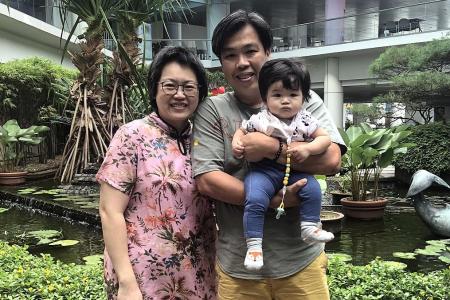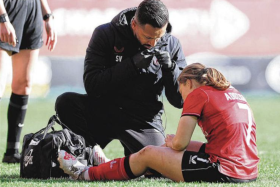Pregnancy-associated breast cancer on the rise
Pregnancy-associated breast cancer on the rise due to women delaying childbearing, says KKH doctor
Madam Evelyn Lo was just 11 weeks pregnant with her first child when she was diagnosed with stage three breast cancer in November 2019.
The tumour was relatively small, but the cancer had spread to the lymph nodes in her arm, of which six out of 19 were cancerous.
The 37-year-old assistant redemption manager told The New Paper: "When I found out I had breast cancer, I was okay with it. But knowing it might affect the baby - that was something I could not accept.
"It's every mother's nightmare to go through something like this, and if it came down to it, I would definitely choose my baby's life over mine."
Madam Lo's condition was managed by an experienced multidisciplinary team from KK Women's and Children's Hospital (KKH), where about 7 per cent of breast cancers in women below the age of 45 are pregnancy-associated.
Pregnancy-associated breast cancer is defined as breast cancer diagnosed during pregnancy and up to a year after childbirth, and has a occurrence of about one in 3,000 pregnancies.
KKH published an article, Pregnancy-Associated Breast Cancer: A Unique Challenge, last October on its Special Delivery online portal, as awareness and early referral are key towards optimising patient outcomes.
Madam Lo underwent surgery early in her second trimester to remove the lumps behind her breast and the lymph nodes less than a month after she was diagnosed.
She began chemotherapy when she was three months into her pregnancy and went for radiotherapy at Singapore General Hospital 20 times in a month. She eventually delivered a healthy baby girl who is now eight months old.
She is in remission but still experiences the occasional numbness in her arm due to the removal of the lymph nodes.
According to Dr Tan Qing Ting, a consultant at the KK Breast Department at KKH, there is a rising trend in the number of pregnancy-associated breast cancer cases.
She told TNP: "Worldwide, the incidence is expected to rise due to women delaying childbearing. As the risk of cancer increases with age, the risk of pregnancy-associated breast cancer is generally lower for younger women.
"However, having children at a younger age does not guarantee that breast cancer will not occur during pregnancy."
Symptoms of pregnancy-associated breast cancer can mimic pregnancy-related breast changes or mastitis, making it harder to detect.
Dr Tan said: "We recommend awareness and vigilance when new symptoms, such as a persistent breast lump or changes in the breast skin and nipple, appear during pregnancy or breastfeeding. These changes may include persistent skin redness, distortion or recent indrawing of the nipple and abnormal nipple discharge.
"These should be carefully investigated by a doctor to ensure a malignancy is not missed."
Treatment for breast cancer such as chemotherapy can affect ovarian function and may result in reduced fertility, but radiotherapy is not associated with a reduction in fertility.
Dr Tan said: "At KKH, experienced breast care nurses provide guidance, support and assurance throughout the patient journey. Together with the patients' family, friends and other breast cancer survivors, this forms a strong psychosocial support network to help patients overcome the difficulties of cancer treatment."
Get The New Paper on your phone with the free TNP app. Download from the Apple App Store or Google Play Store now



